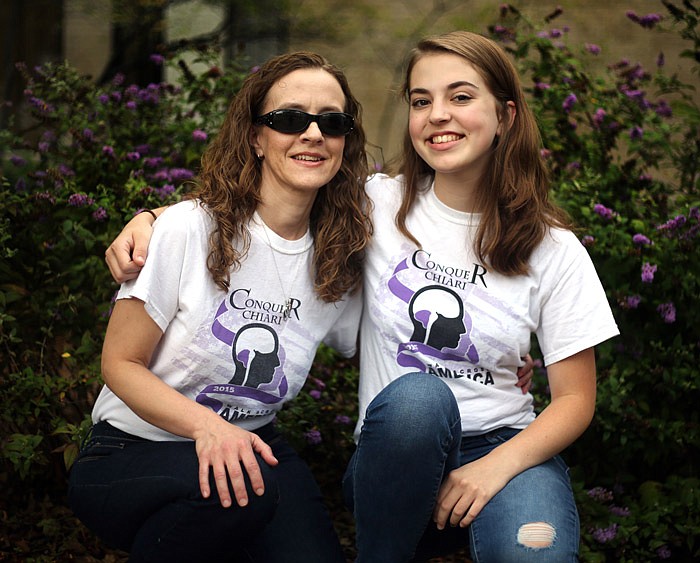Lizzie Cremer, 17, was 14 years old when she helped her mother, Mary Cremer, discover the disorder that had caused her to suffer from severe pain over the past four years.
Chiari, a neurological disorder that affects the spinal cord and nerves throughout the body, was the culprit.
A 1-mile Conquer Chiari Walk will take place at 2 p.m. Saturday at the North Pavilion, welcoming supporters from across Central Missouri.
Stephanie Hampton, volunteer coordinator for the Chiari Walk, and Mary Cremer, 45, describe the disorder as one that changed their lives.
"The best way that I can describe what's happening with people who are diagnosed with Chiari is that their brain has fallen down into the opening of their skull," Cremer said. "This compresses the nerves and blocks cerebral spinal fluid, which causes pain and various symptoms all over your body."
The symptoms for Chiari may include fatigue, migraines, back pains and insomnia, all symptoms that can be related to more common medical issues.
In 2013, the National Institute of Neurological Disorders and Stroke noted Chiari affects about one in every 1,000 births.
Dr. N. Scott Litofsky, chief of the Division of Neurological Surgery at the University of Missouri in Columbia School of Medicine, agrees with the NIND statistics.
"Our group sees at least one referral a week for symptoms that can be potentially be related to Chiari," Litofsky said. "There are varying degrees of the abnormality that we may come across on an MRI, which dictates the kind of treatment we recommend to a patient."
To emphasize the importance of understanding the differences among symptoms related to Chiari, Litofsky discussed other relative disorders such as syringomyelia, a disorder where fluid accumulates on the inside of the spinal cord that compresses and injures the nerves, and hydrocephalus, a condition where there is an accumulation of fluid on the brain.
Cremer's Chiari symptoms started in December 2012. It wasn't until January 2014 that she was medically diagnosed by a specialist, but that was after the help of her 14-year-old daughter.
After constant research about her mother's health issues, Cremer's daughter was able to match her mother's brain herniation to a recent MRI based on a video she had watched online.
Although other conditions may present similar symptoms to Chiari, Cremer was sure her daughter may have solved the mystery to her years of unexplained suffering.
"Over the years, I had over a page and a half of symptoms," Cremer said. "I felt like I was dying, and I wished I was."
Three brain surgeries later, Cremer said she has had the most relief since her most recent surgery this past April.
Hampton has battled Chiari since 2007. Her role in conquering the disorder has helped spread awareness about it across Central Missouri.
Last year's Chiari Walk attracted 100 participants and brought in $2,500 in funds for research and education.
"This year, we are hoping to exceed last year's fundraising goal and continue to build a Chiari family where we feel safe to discuss the issues that we have experienced throughout our battle," Hampton said.
Hampton said doctors' offices are not aware of this neurological disorder and are turning people away because of their own lack of knowledge.
"We may look perfectly healthy, but we're not," Hampton said. "Knowledge is power."
Registration for the Conquer Chiari Walk begins at 1 p.m. Saturday. For more information, contact Hampton at [email protected].


